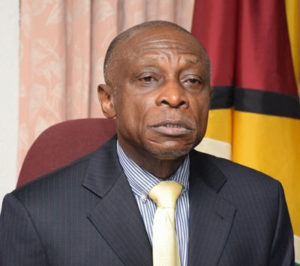One month after Government formally filed legal proceedings against neighbouring Venezuela at the International Court of Justice (ICJ), to finally confirm the legal validity and binding effect of the 1899 Arbitral Award, the coalition has moved to Parliament, seeking millions to pay legal fees.
This request comes at a time when Government is yet to state how much of the US$18 million it received from ExxonMobil in the form of a signing bonus has been expended for this same case. That money is said to be sitting somewhere in the Central Bank in a private account.

According to Financial Paper Number Two of 2018, the Government is requesting G$488,000,000 to meet the estimated cost in 2018 of representing Guyana at the ICJ, including payment of legal fees. While G$300 million was listed as voted provision, G$788,049,000 in supplementary provision is now being sought.
Asked to provide an explanation as to why this amount is being sought, Vice President and Foreign Affairs Minister Carl Greenidge disclosed that that sum will cover the cost for retaining lawyers to do whatever it is that is needed to be done during the course of 2018 in terms of this border case.
“We don’t know exactly how much it would cost, because we don’t know how the court process will unfold. It depends in part on what the court requires. They may look at it and decide to ask us to do this or that…and we might have to go and get somebody else to supplement the information,” he explained.
Greenidge said Venezuela may also choose to appear or not appear, and that too could affect the budget. “So it’s a little difficult to say exactly what will be required; that is why it is an estimate. So we may find at the end of the year that it is less or more. You pay lawyers by time, so it’s very much dependent on them.”
The Minister had said US$15 million of the entire bonus had been set aside for legal fees, but Government might need to find more money as the case progresses. Greenidge said Cabinet has decided that, as the need arises each year, the money would be transferred from the special account at the Bank of Guyana to the Consolidated Fund to “meet the estimated expenditure” for the lawyers.
Meanwhile, the Government has disclosed that the team which represented Guyana in the matter against Suriname in 2007 has been retained. That team is headed by Paul Reichler, a partner in the Washington office of law firm Foley Hoag LLP. There is still no word on which other firm has been hired.
Minister Greenidge has, however, said Government may disclose their entire legal team in eight weeks’ time, depending on how soon the entire arrangement is finalised. The Minister is also not too keen on divulging that information yet, especially since Venezuela is still to decide whether they will challenge the matter.
“When the entire arrangement is tied up, we will let you know…You got firms, and the individuals may not all be free all the time. At the moment, we have recruited three firms, and may likely recruit more, based on the need to do so. Some may be hired part time, as well to do research and so on,” he added.
Guyana’s application to the ICJ follows a decision by UN Secretary General António Guterres to choose the ICJ as the next means of resolving the controversy that arose as a result of the Venezuelan contention that the Arbitral Award in regard to the frontier between British Guiana and Venezuela was null and void.
According to Guyana’s application to the World Court, for more than 60 years, Venezuela had consistently recognised and respected the validity of the binding force of the 1899 Award and the 1905 Map agreed by both sides in furtherance of the Award. Venezuela changed its position formally in 1962, as the United Kingdom was making final preparation for the independence of British Guiana.
The court document further noted that while Venezuela has never produced any evidence to justify its belated repudiation of the 1899 Award, the neighbouring country has used it as an excuse to occupy territory awarded to Guyana in 1899, to inhibit Guyana’s economic development.
The UN Secretary General’s authority to choose the ICJ as the means for resolving the controversy is rooted in the Geneva Agreement of 1966, negotiated just before Guyana attained independence.



